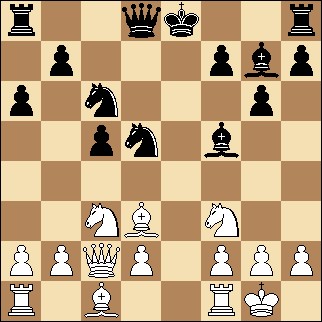Rapidplay 08 (White Hart), 2008
[Geoff Peake] [A85]
1.c4 e6 2.Nf3
d5 3.d4 f5
4.Nc3 Nf6 5.Bf4
c6 6.e3 Be7
7.Bd3 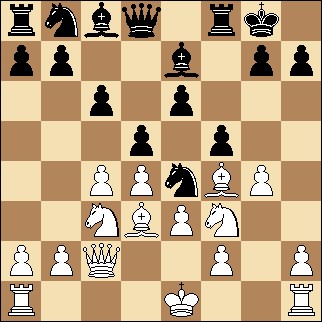 ! This is the exciting 9.g4 attack against the Stonewall. According to theory this gives strong attacking chances for White. - 78% White in 157 games on my database. This forcible disruption of chess balance is entirely in accordance with the style of Alekhine. 9...Nd7 only played 6 times - 9...Na6 and 9...Qa5 are the most common, but 9...Nxc3 is possibly best. The move played does have its point as Black prepares Ndf6. | ||
|
[9...Nxc3 10.bxc3
dxc4 11.Bxc4 fxg4
12.Ne5 Bg5 13.Bd3
Bxf4 14.Bxh7+
Kh8 15.exf4 Nd7
16.Ng6+ Kxh7 17.Nxf8+
Kg8 18.Ng6 Nf8
19.Ne5 c5 20. | ||
| [9...Na6 10.a3 Nxc3 11.bxc3 dxc4 12.Bxc4 Nc7 13.gxf5 Nd5 14.Be5 exf5 15.Rg1 Rf7 16.Rg3 Be6 17.Bd3 h6 18.Rg6 Nf6 19.Bf4 Qd5 20.Ke2 Nh5 21.Bxh6 Kh7 22.c4 Qd6 23.Ne5 Qxe5 24.dxe5 Kxg6 25.Bf4 Nxf4+ 26.exf4 Bc5 27.Rg1+ Kh6 28.Rg3 g6 29.Qc1 Rg8 30.Qg1 Be7 31.Qg2 Rh7 32.h4 Rhg7 33.a4 Bd8 34.Rg5 Rf7 35.Rg3 Rd7 36.h5 Rdg7 37.hxg6 Rxg6 38.Rxg6+ Rxg6 39.Qh3+ Kg7 40.Bxf5 Bxc4+ 41.Bd3 1-0, Vypkhaniuk I - Sitnikov Anton (UKR) 2218, Kiev (Ukraine) 2001] | ||
| [9...Qe8 10.gxf5 ! | ||
|
(10.cxd5 exd5
11.gxf5 Bxf5
12. | ||
|
10...exf5 11.Qb3 | ||
|
10.cxd5 most forcing | ||
|
[10.gxf5 Ndf6 !
looked unclear to me 11.fxe6 Bxe6 12.Ne5 Nxc3 13.bxc3 dxc4 14.Nxc4 c5 15.dxc5 Qd5 16.Rg1 Qxc5 17.Nd2 Rac8 1/2-1/2, Lingnau Carsten (GER) 2392 - Berelovich Aleksandar (UKR) 2541, Berkel (Germany) 2003] | ||
| 10...Nxc3 | ||
|
[10...exd5 11.gxf5
Ndf6 ! 12.Ne5
Bxf5 ? 13.f3
Nxc3 14.Bxf5 | ||
|
[10...cxd5 11.gxf5 | ||
|
11.bxc3 Now Black has an embarrassing
choice of evils. 11...fxg4 My computer played this at first, Black doesn't have a good move. | ||
| [11...cxd5 12.gxf5 exf5 13.Bxf5] | ||
| [11...exd5 12.Bxf5] | ||
|
12.Bxh7+ Black is in deep trouble. 12...Kh8 13.Ne5 with the cruel threat of Ng6+ | ||
| [13.dxc6 is also good, but White may need d6 push [or d5xe6] in some lines, and Black will have to waste a tempo to recapture the pawn.] | ||
13...Nxe5 14.Bxe5 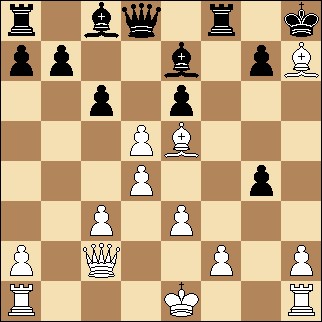 And now I start to dream of Alekhine ! Most of his games were decided in the opening - not of an opening advantage, but of the opponent's position being destroyed ! 14...exd5 ? losing move, but Black may already be lost. | ||
|
[14...Bd6 seems the best try, but Black
is still in trouble. 15.Qg6 Bxe5 16.Qh5 ! Bf4 ! | ||
| (16...Rf3 17.h3 Rxh3 18.Rxh3 gxh3 19.Bg6+ Kg8 20.d6 Qxd6 (20...Bxd6 21.Qh7+ Kf8 22.Qh8+ Ke7 23.Qxg7#) 21.dxe5 Qd7 22.Rd1) | ||
| 17.exf4 Qxd5 18.Bf5+ Kg8 19.Qh7+ Kf7 20.Bg6+ Kf6 21.Be4 with attack.] | ||
|
[14...Qe8 is another try 15.dxc6 | ||
|
(15.h3 is countered by 15...g3) | ||
| 15...bxc6 | ||
| (15...Qxc6 16.Rg1) | ||
| 16.Bg6 Qd8 17.Qe4 Bh4 18.Bg3 Qg5 19.h3 Bxg3 20.fxg3 with attack] | ||
|
[14...Qxd5 White has the same reply 15.Qg6 !! Qxh1+ 16.Kd2 Rxf2+ 17.Kd3 wins] | ||
|
[14...Qa5 15. | ||
| 15.Qg6 ! Bf6 | ||
| [15...Rf6 16.Qh5 Ba3 17.Bg6+ Kg8 18.Qh7+ Kf8 19.Qh8+ Ke7 20.Qxg7+ Ke6 21.Bh7 ! Rf8 22.Qxg4+ Ke7 23.Qg7+ Ke6 24.Rg1 wins] | ||
| 16.Qh5 ! Re8 | ||
|
[16...Rf7 Losing a whole Rook is the only
move to avoid mate according to my computer. 17.Bg6+ Kg8 18.Bxf7+ Kf8 19.Bg6 Be6] | ||
|
17.Bg6+ Kg8 Only
Alekhine. Yes, said Teichmann, if you wanted someone to play a King side attack against the Devil for
your life - You would choose Alekhine. Only Alekhine. Tartakower said 'Morphy was the poet, Steinitz
the fighter, Lasker the philosopher, Capablanca the wonder-kid of intuition, Alekhine the seeker of ultimate
chess truth. Capablanca had the title, Lasker the results, only Alekhine had the style.' Alekhine surveyed
the scene - or rather the position, as his eyes never moved from a fixed gaze on the Black King side.
His body was slightly hunched forward, but he was completely relaxed. His senses did not notice the lingering
smell of cigar smoke, or the odd cough or fidget from the spectators. His nerves were at ease. Only variations
and positions were filtering through his mind. Total concentration - Alekhine was in the zone. Well he
would be - he was in his element. Yes Alekhine lived for chess, but most of all he lived for the attack
against the King. That is when he became totally alive. Then nothing else existed. Life was simple. Fischer
said of Alekhine "I've never understood him. He always wanted a superior centre, he manoeuvred
his pieces towards the king side, and around the 25th move he began to mate his opponents ! ... His play
was fantastically complicated and he once beat World Champion Lasker in 24 moves [and Nimzowitsch in
19 moves! After which Nimzowitsch exclaimed in a fit of temper 'He deals with us like inexperienced
fledglings !' "]. He played gigantic conceptions, full of outrageous and unprecedented ideas. He
had great imagination; he could see more deeply into a situation than any other player in chess history."
Kasparov said " I tried as far as possible to imitate his furious attacking style, with its sudden
and thunderous sacrifices." Well it was only the 18th move, but consternation was written on the
faces of Bogoljubov's supporters. How could it have happened ? Bogoljubov's Stonewall lay in ruins. How
could the "Stonewall" array of pawns lie smashed on the board, when many a mortal player
has died, lying prostate upon its mountainous edifice. How could Bogoljubov's King be cowering in the
corner ? Well the attack was furious alright ! Only one pawn on g7 was left of the pawn cover in front
of the Black King, Alekhine's Bishops were both like lances seeking to penetrate the Black King side.
White's Queen lay in wait like a monster ready to gobble up the Black King, and White's King Knight had
come galloping to e5. Yes it was said of Alekhine that his pieces converged on the King side, and the
game ended with a sudden death blow ! Now Alekhine was going to win the World Chess Championship 8 -
3. Everybody knew that - even Bogolyubov. And everybody's eyes were fixed on Alekhine. His eyes were
sparkling, well they were twinkling. He was happy. There was a child-like innocence about him - He wanted
to be loved as an artist. Not for him the aimless wood pushing of ordinary mortals. He wanted to produce
beautiful creations that would live forever in the annals of chess. That is why the Chess Gods loved
him. Then I came to my senses with a start and came out of my dream. Well okay - This is not Alekhine
Bogoljubov, it's not 1934, the Rapidplay clock's ticking, and I'm not Alekhine, and so I took the Rook. 18.Bxe8 | ||
|
[18.Bd6 !! As Alekhine picked up his Bishop
the audience froze. For a mini second no-one breathed. All eyes were on Alekhine's hand. Realisation
slowly dawned like a ripple. Heads started to nod, men started to smile. A feeling of euphoria came.
Even Bogolyubov's supporters gave grudging respect. And then thunderous applause for the sudden death
blow - the thunderous surprise. 18...Qxd6 19.Qh7+ Kf8 20.Qh8+ Ke7 21.Qxe8#] | ||
|
18...Be6 19.Bg6
Qa5 20. | ||
| [20.Bd6 Qxc3+ 21.Kf1 forces mate.] | ||
|
20...Rd8 21.Bxf6
gxf6 22.Qh7+
Kf8 23.Qh8+
Ke7 24.Qg7+
Kd6 25.Qxf6 and
White won. 1-0 | ||
Peake G.M. - Dave Tooley
Rapidplay HV v Hudd Blitz Boys (White Hart), 2008
[Geoff Peake] [D31]
Alec Ward - Peake G.M.
Rapidplay HV v David Browns (White Hart), 2008
[Geoff Peake] [B20]
G.M.Peake - Paddy Senior
Rapidplay Finals 2008 (West Bretton), 2008
[A86]
|
1.c4 f5 2.d4
g6 3.Nc3 Nf6
4.g3 Bg7 5.Bg2
7.d5 So far so book - exactly the same as the game Peake-Senior [also available to view on-line] 7...c6 This and Na6 are the main book moves. Paddy played 7...e5? in the league game. 8.Be3 An interesting idea. White delays castling, as he may castle Q-side. He also delays Nf4 as he wants to retain the option of Ng5. Here the Bishop may take a Knight that comes to c5, also it is able to go to d4 to oppose the Bishop on g7 in some lines. 8...e5 9.Qd2 A surprising idea that I had seen before this game. White controls f4,g5,h6, and he has the option of Q-side castling. Normally White always plays dxe6. Here Black still retains his weakness on e6. He gains a strong pawn on e5, but this does not prove to be significant. 9...Ng4 The natural move that my computer also plays. 10.Bg5 Now Black is faced with problems. The "ugly" Qd7 seems to best. 10...Qe8 This move I had not seen before. When you come across a non-book move it is best to attempt to come up with the strongest continuation, of course ! | ||
|
[10...Qb6 11.Be7 | ||
| [10...Qc7 11.dxc6 bxc6 | ||
|
(11...Nxc6 12.Nb5 | ||
| 12.Nb5 !] | ||
11.dxc6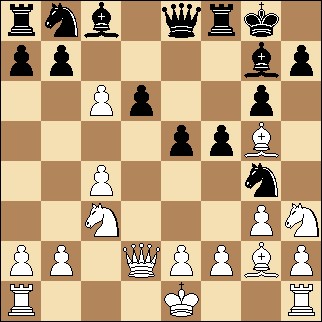 ! This is strong. The first point is that bxc6 is strongly answered by Nb5 ! 11...Nxc6 Now Black has a massive "hole" at d5. This can be used by the Bishop, Queen and Knight. In fact it will be seen that ALL these pieces use the d5 square. Also White's Knight can use b5. White has the open d file, Black has a backward pawn on d6. Are you convinced ? | ||
|
[11...bxc6 12.Nb5
h6 13.Nxd6
Qe6 14.Bh4
g5 15.Bxg5
hxg5 16.Nxg5
Qf6 17.Bd5+
Kh8 18.Ndf7+
Kg8 19.h3 | ||
|
12.f3 Black was threatening h6. I hardly
considered taking the useless pawn on d6, as Black has e4 and Be6 etc. | ||
|
[12.Nb5 looks strong, but 12...h6 13.Nc7 Qd7 14.Nxa8 hxg5 looked unclear to me.] | ||
| 12...h6 13.fxg4 hxg5 | ||
|
[13...fxg4 was the move that I expected,
but 14.Bd5+ Be6 15.Nb5 !! was the sack that I was looking at. 15...hxg5 16.Nxg5 This is an absolute killer. The computer shows this as completely won for White at +4 16...Bxd5 17.Qxd5+ Kh8 18.h3 ! Bh6 19.hxg4 Kg7 20.Rxh6 Kxh6 21.Qh1+ Kg7 22.Qh7+ Kf6 23.Ne4+ Ke6 24.Nc7#] | ||
| 14.Nxg5 Bh6 | ||
|
[14...fxg4 I thought was okay for Black
at the time, but White has... 15.Bd5+ Kh8 16.h3 ! This is losing for Black 16...gxh3 17.Nxh3 Black doesn't have a move.] | ||
|
15.h4 The Knight is entrenched on g5,
and if it is taken Black loses his K-Bishop and the h-file becomes open, so that the Black King is in
danger. 15...Be6 16.Bd5 The struggle for White square dominance is being won by White ! 16...Rf6 | ||
|
[16...Nd4 appears best, but 17.Bxe6+ Nxe6 18.Qd5 Bxg5 19.hxg5 Qf7 20.Qxd6 fxg4 21.Qxe5 Qf2+ 22.Kd2 Rad8+ 23.Nd5 Qd4+ 24.Qxd4 Nxd4 25.Rh6 | ||
| 17.Bxe6+ | ||
|
[17.e3 ! it is stronger than I thought
as White has Qh2... Here I did consider 17...Bxg5 18.hxg5 Rf7 19.Qh2 wins] | ||
|
17...Rxe6 18.Qd5
Bxg5 forced 19.hxg5
Nb4 20.Qd2 ?
played quickly, I missed the strength of Qxb7. | ||
|
[20.Qxb7 ! wins immediately as White threatens
the Knight as well as h7 square ! 20...Rb8 | ||
| (20...Nc2+ 21.Kd2 Re7 22.Qd5+ Kg7 23.Kxc2) | ||
| 21.Qh7+ Kf8 22.gxf5 gxf5 23.Qxf5+ Ke7 | ||
| (23...Qf7 24.Rh8+ Ke7 25.Rh7) | ||
| (23...Kg8 24.Qh7+ Kf8 25.Rf1+) | ||
| (23...Kg7 24.Qh7+ Kf8 25.Rf1+) | ||
| 24.Nd5+ Kd8 25.Nf6 wins] | ||
|
20...Qc6 attacking the Rook on h1 and
the c4 pawn. However White has two strong replies. 21.Nd5 21...Qxc4 Unfortunately Black has nothing better. | ||
| [21...a5 22.a3 Na6 23.gxf5 gxf5 24.g6 ! Black can resign. [What did I say about g6 ?]] | ||
| [21...Na6 22.gxf5 gxf5 23.g6 ! wins] | ||
|
22.Nxb4 Rc8
23.Kf2 connects the Rooks, threatens
Rc1, defends g3 pawn. 23...Qxg4 ?? loses the Queen. | ||
|
[23...Qc5+ is best but 24.Kg2 wins a5 25.Rac1 etc.] | ||
| [23...Qe4 24.Rh6 fxg4 25.Rah1 Rf8+ 26.Ke1 Qb1+ 27.Qd1 Qxd1+ 28.Kxd1 Kf7 29.Rh7+ Ke8 30.Rxb7 is hopeless.] | ||
24.Rh4 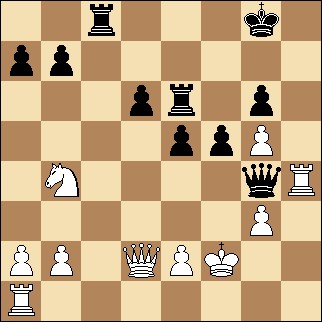 For the second game in a row against me Paddy's Queen has run out of squares !! 24...Qxh4 25.gxh4 Kg7 26.Rc1 Rh8 27.Rc7+ Kf8 28.Qd5 Black resigns, it's mate in 5. It's fitting that the d5 square is used again ! 1-0 | ||
G.M.Peake - Phil C. Clarke
Rapidplay Finals HV v Brighouse Bd 2 (West Bretton), 2008
[E81]
|
1.c4 Nf6
2.Nc3 g6
3.e4 d6
4.d4 Bg7
5.Be3 7...Qa5 | ||
[7...dxc5 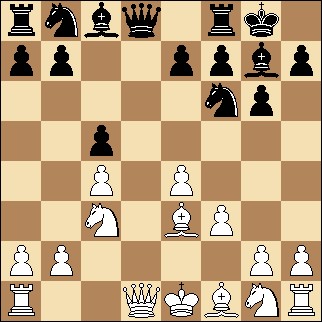 is normal. This pawn sacrifice has done well for Black ! 8.Qxd8 Rxd8 9.Bxc5 Nc6 10.Rd1 | ||
|
(10.Nd5 I would probably have played.
This was prefered by Karpov 10...Nd7 11.Bxe7 Nxe7 12.Nxe7+ Kf8 13.Nd5 Bxb2 14.Rb1 Bg7 (14...Ba3 15.Nh3 b6 16.Be2 Ne5 17.Nf2 Bb7 18.f4 Nc6 19.h4 Nd4 20.Rh3 Rac8 21.h5 Bxd5 22.cxd5 Rc2 23.Bd3 Rxa2 24.Bc4 Rc2 25.Rxa3 Rxc4 26.Rxa7 b5 27.h6 b4 28.Ng4 Nc2+ 29.Kd2 Na3 30.Rf1 Rxe4 31.Nf6 Rd4+ 32.Ke3 Nc2+ 33.Kf3 Rd3+ 34.Ke2 R3xd5 35.Nxh7+ Kg8 36.Nf6+ Kh8 37.Nxd5 Rxd5 38.Rxf7 b3 39.Rb7 Nd4+ 40.Kf2 Nb5 41.Ra1 Rd2+ 42.Kg3 Ra2 43.Rd1 1-0, Karpov Anatoly 2715 - Polgar Judit 2575 , Monaco 1992 It (active)) 15.Nh3 Nc5 16.Nf2 b6 (16...Be6 17.Nd3 Rac8 18.Nxc5 Rxc5 19.Rxb7 Ra5 =) 17.h4 Ba6 18.h5 Rac8 19.Ng4 Nd7 20.hxg6 hxg6 21.Rb4 Bb7 22.Nge3 Bd4 23.Kd2 Kg7 24.Be2 Ne5 25.Rc1 f5 26.Rb3 fxe4 27.fxe4 Nc6 28.Bg4 Rb8 29.Rd3 Be5 30.c5 b5 31.Be2 a6 32.Ng4 Bb2 33.Rh1 Ne5 34.Nxe5 Bxe5 35.Bg4 Bc6 36.Ke3 a5 37.Rhd1 Re8 38.Nb6 Bb2 39.Bf3 Be5 40.Nd7 Bc7 41.e5 Bxf3 42.Kxf3 Bxe5 43.Re3 Rbd8 44.c6 Bc7 45.Rxe8 Rxe8 46.Nc5 Kf7 47.Rd5 Re7 48.Na6 b4 49.g4 Ke6 50.Rg5 Bd6 51.Rxa5 Ra7 1-0, Karpov Anatoly 2760 - Ivanchuk Vassily 2705 , Monaco 1993 It "Melody Amber" (blindfold)) | ||
| 10...Rxd1+ 11.Nxd1 Black has good compensation for the sacrificed pawn.] | ||
| 8.cxd6 exd6 | ||
|
[8...Rd8 ! I expected 9.Nge2 Rxd6 10.Qa4 | ||
|
9.Bd3 I knew playing this that Black
Knights using e5/c5 would be annoying but I was not averse to swapping the light squared Bishop for a
Knight as this Bishop gets in the way of development, and is not particularly active with white pawns
on b3,c4,e4,f3. However after losing this Bishop White must guard the weak light squares d3,c2,e2 9...Nc6 10.Nge2 Ne5 11. | ||
| [11...Re8 12.Bd4 Be6 13.Nd5 Rac8 14.Nxf6+ Bxf6 15.b3 Bg7 16.Kh1 Bf8 17.Nf4 Nxd3 18.Qxd3 Qg5 19.Nxe6 Rxe6 20.Rad1 b6 21.Bb2 h5 22.Qd4 Qh6 23.Qd5 Rce8 24.Bd4 h4 25.Rfe1 h3 26.g3 Kh7 27.f4 Qh5 28.Qxh5+ gxh5 29.e5 dxe5 30.Rxe5 f6 31.Rxh5+ Kg6 32.Rxh3 Rd6 33.f5+ Kg7 34.Rh4 Red8 35.Kg2 R6d7 36.Kf3 Bc5 37.Ke3 Re7+ 38.Re4 Red7 39.Rd2 a5 40.h4 Kh6 41.g4 Rd6 42.Bxc5 Rxd2 43.Bd4 Rxa2 44.Re7 Rxd4 45.Kxd4 Rd2+ 46.Kc3 Rg2 47.Rf7 Rg3+ 48.Kb2 Rxg4 49.Rxf6+ 1-0, Meiser Markus (GER) 2222 - Djondras Blasko (GER) 2161, Germany 1999] | ||
12.b3 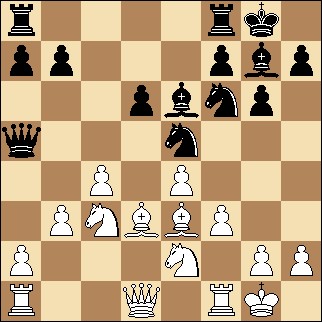 White has got to be better, a safe pawn to the good and a solid position. 12...Nxd3 13.Qxd3 Nd7 14.Rac1 safety first, Rd1 is more aggressive. 14...Ne5 15.Qd2 | ||
| [15.Qxd6 Rfd8 would be stupid for White.] | ||
|
15...Rfd8 16.Nd5 I
am happy to go into an ending a pawn up with Black having a backward pawn on d6, a hole at d5 etc. 16...Qxd2 17.Bxd2 Rac8 ?? a Rapidplay blunder. | ||
|
[17...Bxd5 18.cxd5
Nd3 gives White problems because of
the Knight on d3. 19.Rcd1 Rdc8 20.Bg5 Rc2 21.Rxd3 Rxe2 22.Rd2 Rxd2 23.Bxd2 Bd4+ 24.Kh1 Rc8 25.Rc1 | ||
|
18.Ne7+ Kh8
19.Nxc8 Bxc8
20.Nc3 ? Greedy for Nd5, but played
too quickly, I neglected to take care of the weak d3 square. Now Black has Nd3 | ||
|
[20.Rfd1 ! White has a winning position. 20...Nd3 21.Rc2 Nb2 22.Bg5 f6 | ||
| (22...Rd7 23.Rdd2) | ||
| 23.Rxb2] | ||
|
20...Nd3 Parting with the light squared
Bishop has finally caused me problems. 21.Rc2 Bd4+ | ||
|
[21...Nb4 ! is better but 22.Rb2 Nd3 23.Rbb1 Bd4+ 24.Kh1 Nf2+ 25.Rxf2 Bxf2 26.Bg5 Rd7 27.Bf6+ Kg8 28.Nd5 and Nd5 White still has a dominating position.] | ||
| 22.Kh1 Nf2+ ?! | ||
| [22...Nb4 23.Rcc1 Nd3 24.Bg5 f6 25.Rcd1 is not much better.] | ||
|
23.Rxf2 Bxf2
24.Bg5 Black can resign, but it is
Rapidplay. 24...Bb6 25.Bxd8 Bxd8 26.Nb5 Pouring on the agony ! 26...Be7 27.Rd2 Bd7 28.Nxd6 attacking two pawns at once. 28...Bxd6 29.Rxd6 Bc6 30.b4 a6 31.Rxc6 Simplest for a quick finish. 31...bxc6 32.a4 Kg8 33.b5 Black resigns, a pawn must queen. 1-0 | ||
G.M.Peake - Martin Sheard
Rapidplay Finals 2008 (West Bretton), 2008
[B36]
1.c4 c5
2.Nf3 Nc6
3.d4 cxd4
4.Nxd4 g6
5.e4 Nf6
6.Nc3 Nxd4
7.Qxd4 d6
8.Be3 Bg7
9.f3 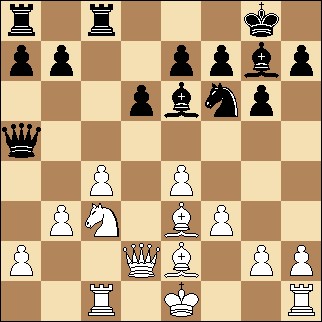 All book - but 62 % White in 339 games. 13...Qd8 | |
|
[13...a6 is the main line. 14.Na4 Qxd2+ 15.Kxd2 Nd7 16.g4 White has the better ending 72 % White in 120 games.] | |
|
14. | |
| [15.Kh1 a5 16.Rfd1 Nc5 17.Bg5 Qf8 18.Qe3 f6 19.Bf4 Re8 20.Qd2 f5 21.Nd5 Rac8 22.exf5 Qxf5 23.Be3 Bxd5 24.cxd5 b6 25.Bb5 Rf8 26.Re1 Be5 27.Rcd1 Rf7 28.Rf1 Qh5 29.Bg1 Rcf8 30.Qe2 g5 31.Rc1 Rf4 32.Rc4 Qg6 33.Rxf4 Rxf4 34.g3 Rf7 35.Kg2 Qf5 36.Rc1 Rf6 37.Rc4 Rh6 38.Rg4 Rh5 39.h4 Kh8 40.Be8 gxh4 41.Bxh5 h3+ 42.Kh2 Qxh5 43.f4 1-0, Mrdja Milan (CRO) 2313 - Vuelban Virgilio (PHI) 2314, Rome (Italy) 2005.03.16] | |
|
15...Nc5 16.f5 1/2-1/2 | |
